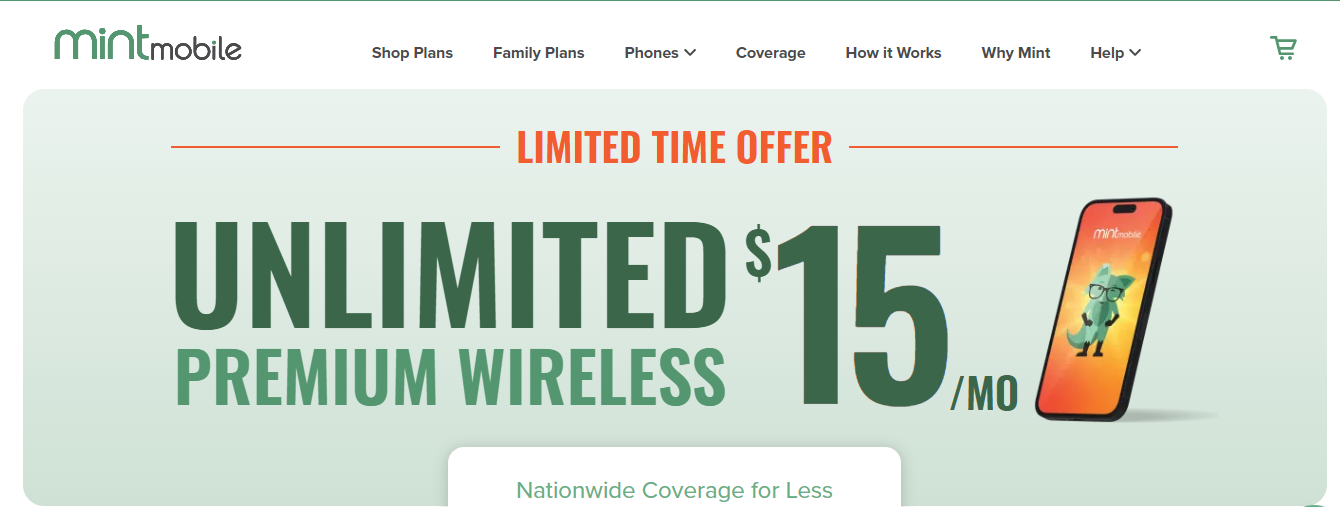In a world dominated by smartphones, choosing the right mobile plan is crucial. With a plethora of options available, it can be overwhelming to navigate through the various carriers and their offerings. To make this decision easier for you, we’ve compiled a list of the 10 best brands for mobile plans. These companies have consistently stood out for their network coverage, plan flexibility, pricing, and customer service.
- Verizon
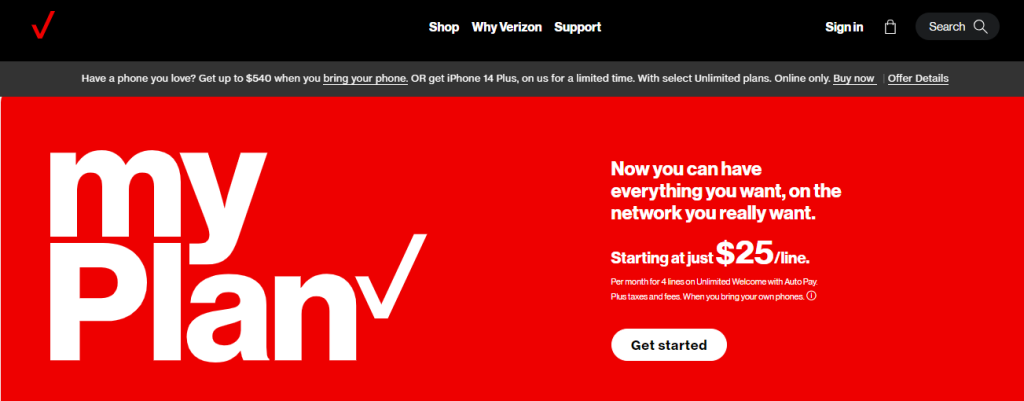
Verizon is renowned for its exceptional network coverage across the United States. They offer a wide range of plans to cater to different needs, from basic prepaid options to unlimited data plans. While they may not always be the cheapest option, the reliability of their network makes them a top choice for many consumers.
Services Offered by Verizon
- Wireless Communication : Verizon offers a comprehensive range of wireless plans for individuals, families, and businesses. These plans include voice, text, and data services, with options for various device types.
- Fios Internet and TV : Verizon’s Fios service delivers high-speed internet and a robust television package, boasting advanced features such as on-demand content and streaming capabilities.
- Business Solutions : Verizon’s enterprise services encompass a broad spectrum, including cloud solutions, security, IoT (Internet of Things), and networking solutions tailored to businesses of all sizes.
- Home Phone and Home Security : Verizon also provides traditional landline services and advanced home security systems, integrating modern technology for enhanced safety
Pricing Overview
- Wireless Plans : Verizon’s wireless plans vary based on data allowances, number of lines, and device types. Prices start at around $35 per line for basic plans, while unlimited data plans typically begin at $60 per line.
- Fios Internet and TV : Fios Internet packages start at approximately $39.99 per month for standalone internet, while bundled internet and TV packages start at around $79.99 per month.
- Business Solutions : Pricing for business services varies widely based on the specific needs of the enterprise. Customized quotes are typically provided based on the scope and scale of services required.
- AT&T
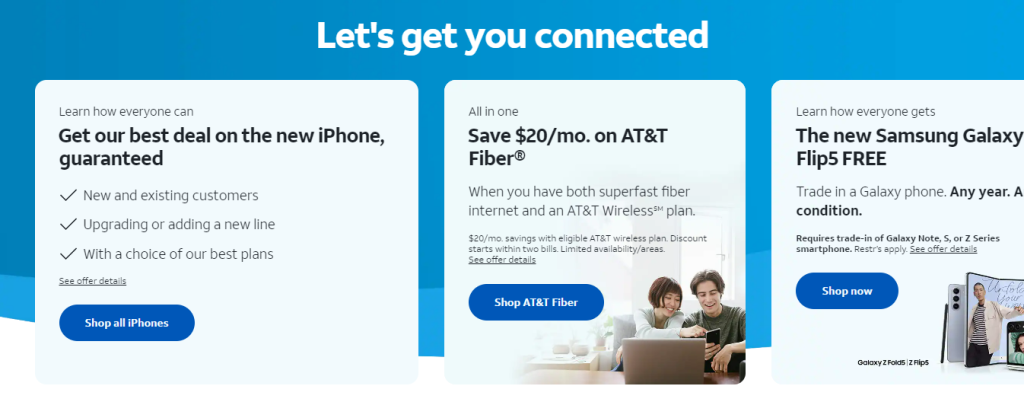
AT&T boasts an extensive network and provides a variety of plans suitable for individuals, families, and businesses. Their unlimited data plans often come with added perks like HBO Max or access to premium content. They also offer a strong international roaming package for travelers.
Prices
- Wireless Plans
- Unlimited Starter: Starting at $65/month for one line.
- Unlimited Extra: Starting at $75/month for one line.
- Unlimited Elite: Starting at $85/month for one line.
- Internet Plans
- AT&T Fiber 300: Starting at $55/month.
- AT&T Fiber 1000: Starting at $70/month.
- Television Packages
- DIRECTV: Packages start at $64.99/month.
- AT&T TV: Packages start at $69.99/month.
Pros
- Extensive Network: AT&T boasts one of the largest and most reliable networks in the United States.
- Diverse Service Offerings: From wireless to broadband, TV, and business solutions, AT&T provides a comprehensive range of services.
- Innovative Technology: Their deployment of fiber-optic technology and investments in 5G networks demonstrate a commitment to cutting-edge technology.
Cons
- Pricing Complexity: The variety of plans and bundles can be confusing, and customers may need to carefully compare options to find the best value.
- Contract Lengths: Some services may require contracts, which can be a consideration for those looking for more flexibility.
- Customer Service: Like many large telecom companies, AT&T’s customer service can sometimes receive mixed reviews.
- T-Mobile
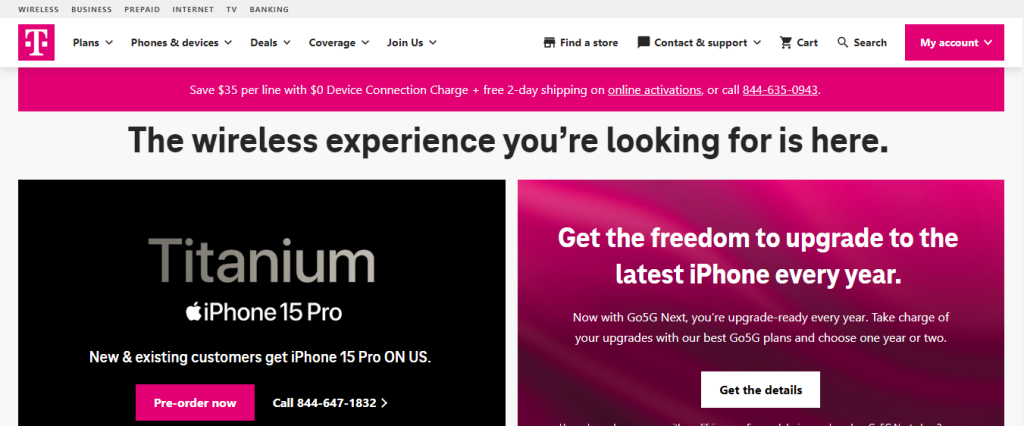
T-Mobile has gained popularity for its competitive pricing and impressive data speeds. With their “T-Mobile Tuesdays” promotions and perks like Netflix on family plans, they provide excellent value for money. Their merger with Sprint has further strengthened their network coverage.
Prices
- Wireless Plans:
- Individual plans typically start at around $50 to $70 per month.
- Family plans can range from $100 to $200 per month depending on the number of lines and desired features.
- 5G Home Internet:
- Prices for home internet start at approximately $60 per month.
- Device Costs:
- The cost of smartphones and other devices can be paid upfront or through monthly installment plans, varying based on the model and features.
Pros:
- Expansive 5G Network: T-Mobile’s robust 5G network provides high-speed internet access to a wide range of areas, improving overall connectivity.
- Competitive Pricing: T-Mobile offers competitive pricing on their plans, often providing value for money compared to other carriers.
- Customer-Focused Policies: T-Mobile is known for its customer-friendly policies, such as no-contract plans and transparent pricing structures.
- Innovative Initiatives: The company is dedicated to technological advancements, often pioneering new features and services in the industry.
Cons:
- Coverage Variability: While T-Mobile’s network has expanded significantly, coverage can still vary depending on location, with some rural or remote areas experiencing limited service.
- Device Compatibility: Some older or less common devices may not be fully compatible with T-Mobile’s network, potentially limiting options for existing device owners.
- Plan Limitations: Some lower-tier plans may have data caps or speed restrictions, which could impact heavy data users.
- Dependence on 5G Availability: The full benefits of T-Mobile’s offerings are most realized in areas with strong 5G coverage. In areas without it, the experience may not be as exceptional.
- Mint Mobile
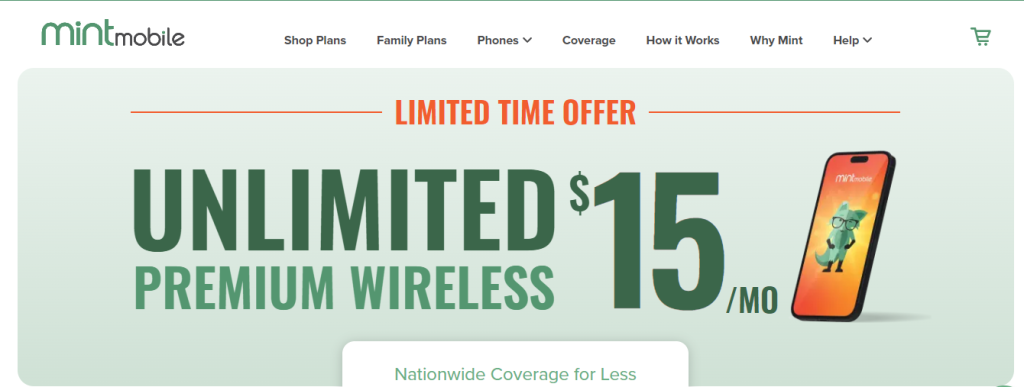
Mint Mobile is a disruptor in the mobile industry, known for its affordable plans and unique pricing structure. They offer plans in bulk (3, 6, or 12 months) which leads to significant cost savings. While their network coverage relies on T-Mobile’s infrastructure, Mint Mobile’s pricing is hard to beat.
Here’s a general breakdown of Mint Mobile’s pricing structure
- 3-Month Plans:
- Prices typically start at around $15 per month for the lowest-tier plan, which includes a certain amount of high-speed data.
- 6-Month Plans:
- Monthly prices may be even lower, offering more value for a longer commitment.
- 12-Month Plans:
- These usually provide the best value, with prices often starting at around $15 per month or even less.
Services Offered:
- Prepaid Plans: Mint Mobile offers prepaid mobile phone plans, which means you pay for your service upfront rather than at the end of a billing cycle. This can often lead to cost savings compared to traditional postpaid plans.
- No Contract Commitment: Mint Mobile does not require a long-term contract. This flexibility allows customers to change their plans or providers without facing early termination fees.
- SIM Card Activation: Mint Mobile operates on a bring-your-own-device (BYOD) model. Customers can order a Mint Mobile SIM card, which they can insert into their compatible device to access Mint Mobile’s network.
- Mobile Data: Mint Mobile offers 4G and 5G data coverage, depending on your device’s capabilities and network availability.
- Voice and Text: All plans include unlimited nationwide talk and text.
Pros:
- Affordable Pricing: Mint Mobile’s plans are competitively priced, especially when purchased in bulk (3, 6, or 12 months).
- No Contracts: Mint Mobile operates on a prepaid basis, meaning you’re not tied to a long-term contract.
- T-Mobile Network: Mint Mobile leverages T-Mobile’s extensive network, providing reliable coverage for most urban and suburban areas.
- Variety of Plan Options: Mint Mobile offers a range of data options, catering to different user needs.
Cons:
- Limited Retail Presence: As of my last knowledge update in September 2021, Mint Mobile primarily operates online, which means you might not have the option to visit a physical store for support or inquiries.
- Data Speed Throttling: After reaching the allocated high-speed data limit, Mint Mobile may throttle speeds, which could affect activities like video streaming or large file downloads.
- Device Compatibility: Mint Mobile operates on GSM networks, so ensure your device is compatible before switching.
- No Family Plans: Mint Mobile doesn’t offer traditional family plans, which may be a drawback for those looking to bundle services for multiple family members.
- Sprint (now part of T-Mobile)
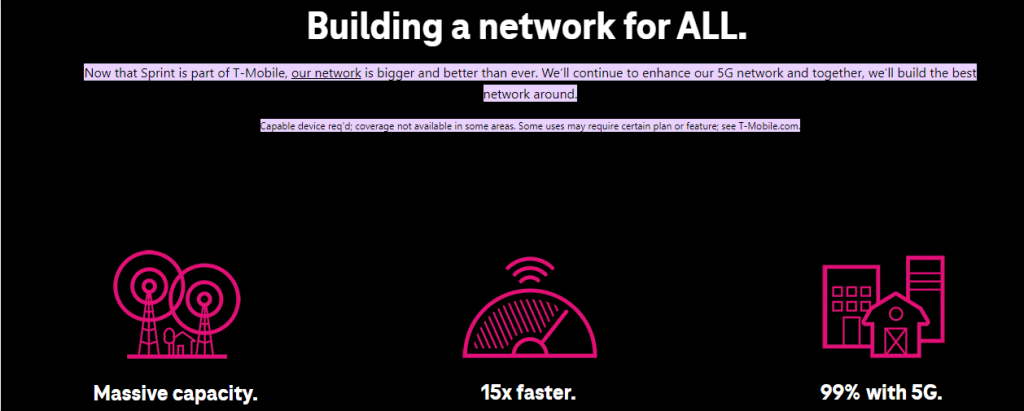
Sprint, now merged with T-Mobile, offers affordable plans with a focus on unlimited data. Their plans are particularly popular with budget-conscious consumers and families. The merger has resulted in an expanded network coverage, making them a stronger contender in the market.
Services:
- Wireless Communication: Sprint offered a wide range of wireless communication services, including mobile phones, data plans, and accessories.
- Internet Services: In addition to wireless services, Sprint provided internet solutions for both residential and business customers.
- Business Solutions: Sprint offered tailored solutions for businesses, including mobile device management, IoT (Internet of Things) solutions, and unified communication services.
- International Roaming: Sprint offered international roaming services, allowing customers to use their devices abroad with compatible networks.
Pros:
- Wide Coverage: Sprint (now T-Mobile) had a strong network presence in the United States, offering reliable coverage in urban and suburban areas.
- Competitive Pricing: Sprint was known for its competitive pricing, often offering plans at a lower cost compared to some of its competitors.
- Innovative Plans: Sprint introduced innovative plans, such as unlimited data plans, which appealed to heavy data users.
- Business Solutions: The carrier provided comprehensive solutions for businesses, including mobile device management and IoT services.
Cons:
- Network Integration Challenges: After the merger with T-Mobile, there were challenges in integrating the networks, which could lead to service disruptions and coverage issues for some customers.
- Limited Rural Coverage: While Sprint had strong urban coverage, it was criticized for having less comprehensive coverage in rural and remote areas.
- Device Compatibility: Some devices that were originally compatible with Sprint’s network might face limitations after the merger with T-Mobile.
- Customer Service: Like many large carriers, Sprint’s customer service was sometimes criticized for response times and issue resolution.
- Google Fi

Google Fi stands out for its unique approach to mobile plans. It combines multiple networks (T-Mobile, Sprint, and U.S. Cellular) along with Wi-Fi for seamless coverage. This innovative approach often leads to cost savings, especially for light data users and frequent travelers.
Pricing:
- Flexible Plan: $20 per month for unlimited talk and text, with data charged at $10 per GB. Customers are credited for unused data.
- Unlimited Plan: Starting at $70 per month for unlimited talk, text, and data. After a certain threshold of high-speed data usage, speeds may be reduced during periods of network congestion.
Services:
- Flexible Data Plans: Google Fi offers a range of flexible data plans designed to accommodate different usage patterns. Customers pay for the data they use, with a base fee for unlimited calls and texts.
- International Roaming: Google Fi excels in international travel. It provides free texting in over 200 countries, affordable calling rates, and high-speed data in over 200 destinations, without the need for a separate SIM card.
- Wi-Fi Calling: Fi leverages Wi-Fi networks for calling and texting, ensuring a robust connection even in areas with weak cellular coverage.
- Network Switching: Google Fi automatically switches between different cellular networks and Wi-Fi, ensuring optimal signal strength and coverage.
- Data-only SIM Cards: Users can add data-only SIM cards to their plan for tablets, laptops, or other devices, sharing the same data pool.
- Google Fi VPN (Virtual Private Network): This feature enhances online security and privacy by encrypting internet traffic on unsecured networks.
Pros:
- International Travel: Google Fi is an excellent choice for travelers, offering seamless connectivity in over 200 countries.
- Flexible Pricing: Customers only pay for the data they use, making it cost-effective for those with varying data needs.
- Network Switching: Automatic switching between multiple networks ensures a stable and reliable connection.
- Wi-Fi Calling: Strong Wi-Fi calling capabilities can save on cellular data usage and provide stable connections in areas with Wi-Fi coverage.
- Data-only SIMs: Convenient for users with multiple devices, allowing them to share the same data pool.
Cons:
- Device Compatibility: While Google Fi is compatible with a wide range of devices, not all phones are supported.
- Limited Phone Selection: The range of available phones directly from Google Fi may be more limited compared to larger carriers.
- Data Speed Throttling: On the Unlimited Plan, data speeds may be reduced after a certain threshold of high-speed data usage during network congestion.
- Not Available Worldwide: Google Fi is primarily targeted at U.S. customers, so its availability may be limited for international users.
- Metro by T-Mobile
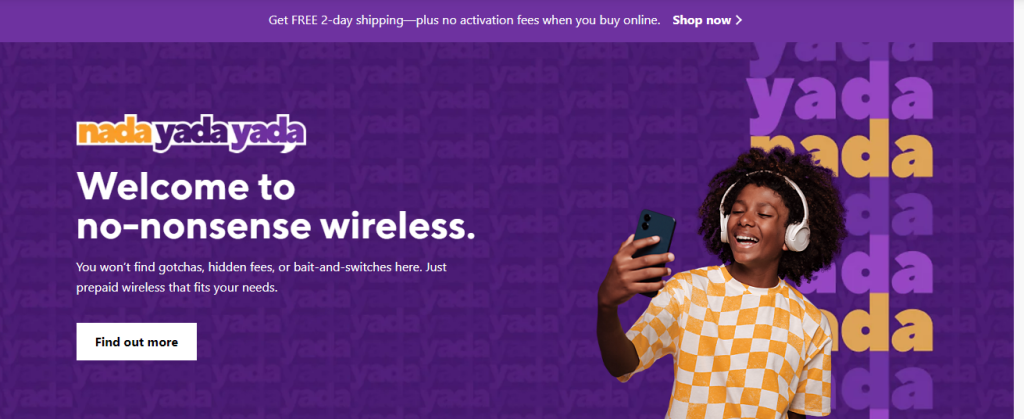
Metro by T-Mobile, formerly known as MetroPCS, is a prepaid carrier owned by T-Mobile. They offer a variety of budget-friendly plans with competitive features. Metro’s plans include taxes and fees in their pricing, providing transparency and simplicity for customers.
Prices :
- Plans start at around $30 per month and can go up to $60 or more, depending on the features and data allowances included.
Services:
- Prepaid Plans: Metro offers a variety of prepaid plans that cater to different needs, including talk, text, and data services.
- Unlimited Data: Many of Metro’s plans come with unlimited data, allowing customers to browse, stream, and download without worrying about data caps.
- 5G Network Access: Metro customers have access to T-Mobile’s extensive 5G network, providing high-speed internet connectivity in supported areas.
- International Services: Metro offers international calling and texting options, as well as international roaming in certain plans, making it a convenient choice for travelers.
- Mobile Hotspot: Some plans include mobile hotspot functionality, allowing users to share their phone’s internet connection with other devices.
Pros:
- Affordable Pricing: Metro offers competitive pricing, making it an attractive option for budget-conscious consumers.
- No Contracts: Customers are not tied to long-term contracts, providing flexibility to switch plans or providers as needed.
- 5G Access: Access to T-Mobile’s 5G network ensures fast and reliable internet connectivity in supported areas.
- International Options: Metro’s international services are a plus for users who need to stay connected with friends and family abroad.
Cons:
- Limited Device Options: Metro may have a more limited selection of devices compared to larger carriers.
- Coverage Variability: While T-Mobile’s network is extensive, coverage may still vary in certain areas, particularly in more rural or remote locations.
- Data Throttling: In some plans, data speeds may be reduced after reaching a certain threshold, which can affect streaming quality and download speeds.
- Customer Service: Like many wireless carriers, customer service experiences can vary, and some customers may encounter issues with support.
- Cricket Wireless

Cricket Wireless, owned by AT&T, offers affordable plans with no annual contracts. They provide a good selection of plans for various needs, including unlimited data options. Their strong network coverage, especially in urban areas, makes them a popular choice for budget-conscious consumers.
Pricing:
- Basic Plan:
- Starts at $30 per month, includes unlimited talk and text, 2GB of high-speed data.
- Smart Plan:
- Priced at $40 per month, includes unlimited talk and text, 10GB of high-speed data.
- Unlimited Plans:
- Prices vary based on data speed and features. Starting at $55 per month, offering unlimited high-speed data (with certain limitations).
- Family Plans:
- Offer discounts for multiple lines on a single account, with savings increasing as more lines are added.
Services:
- Prepaid Plans:
- Cricket offers a variety of prepaid plans that cater to different usage patterns. These plans typically include unlimited talk and text, with varying amounts of high-speed data.
- Network Coverage:
- Cricket operates on the AT&T network, providing robust coverage across urban and rural areas. This ensures that customers can stay connected no matter where they are.
- Device Selection:
- Cricket offers a wide range of smartphones, catering to various budgets and preferences. Customers can choose from popular brands and models.
- Add-Ons and Features:
- Customers have the option to add extra features like mobile hotspot, international calling, and data speed boosts to their plans.
Pros:
- Affordability: Cricket Wireless is known for its competitive pricing, making it an attractive option for budget-conscious consumers.
- Robust Network: Utilizing the AT&T network, Cricket offers reliable coverage across a wide geographic area.
- No Contracts: Customers are not tied to long-term contracts, providing flexibility and allowing them to switch plans or providers as needed.
- Wide Device Selection: From budget-friendly to flagship models, Cricket offers a diverse range of smartphones to suit different preferences and budgets.
- Add-Ons for Customization: Customers can personalize their plans with various add-ons like mobile hotspot, international calling, and more.
Cons:
- Data Speed Limitations: On unlimited plans, data speeds may be slowed after reaching a certain threshold, which could affect performance for some users.
- Limited International Coverage: While international add-ons are available, Cricket’s international coverage may not be as extensive as some other carriers.
- Customer Support: Some users have reported occasional challenges with customer service responsiveness.
- Device Restrictions: Some unlocked or non-Cricket devices may not be compatible with Cricket’s network.
- US Mobile

US Mobile is a customizable carrier that allows you to build your own plan based on your specific needs. This flexibility, coupled with affordable pricing, makes them an attractive option for those who want complete control over their mobile plan.
Services Offered:
- Customizable Plans: US Mobile offers highly customizable plans where customers can choose the number of talk minutes, text messages, and data they need.
- Talk and Text: They offer nationwide talk and text services with various options for minutes and messages.
- Data Plans: Customers can select data plans based on their usage, ranging from a few hundred MB to unlimited high-speed data.
- International Roaming: US Mobile provides international roaming options for those who travel frequently.
- Mobile Hotspot: Many plans include mobile hotspot capabilities, allowing users to share their phone’s data connection with other devices
Pros:
- Customization: US Mobile allows users to tailor their plans to their specific needs, ensuring they only pay for the services they use.
- Affordability: US Mobile often offers more budget-friendly options compared to major carriers.
- Network Options: Customers can choose between T-Mobile or Verizon networks, providing flexibility in terms of coverage and compatibility with different devices.
- No Contract Commitment: US Mobile typically operates on a no-contract, prepaid basis, allowing users to change or cancel their plans without long-term commitments.
Cons:
- Limited Device Selection: As an MVNO, US Mobile may not offer as wide a selection of devices or the latest flagship models compared to major carriers.
- Customer Support: Some users have reported mixed experiences with customer support, with occasional delays or difficulties in resolving issues.
- Network Priority: In times of network congestion, customers on MVNOs like US Mobile may experience slower data speeds compared to direct carrier customers.
- International Coverage: While US Mobile offers international roaming, the coverage and rates may not be as competitive as some other carriers.
- Visible

Visible is an online-only carrier owned by Verizon, offering unlimited data plans at a competitive price. They operate entirely through their app, which makes managing your plan convenient and hassle-free. Visible’s transparent pricing and strong network coverage make them a popular choice for value-conscious consumers.
Pricing :
- Visible Unlimited Plan:
- $40/month: This includes unlimited data, talk, text, and mobile hotspot.
Services:
- Unlimited Data:
- Visible offers unlimited 4G LTE data, though during times of network congestion, speeds may be temporarily slowed.
- Talk and Text:
- Unlimited domestic talk and text are included in the base plan.
- Mobile Hotspot:
- Visible provides mobile hotspot capabilities at no extra cost. This allows you to share your phone’s data connection with other devices.
- No Contracts:
- Visible is a contract-free service, providing flexibility without the need for a long-term commitment.
Pros:
- Affordable Pricing:
- Visible’s pricing is competitive and often more affordable than traditional carriers.
- Unlimited Data:
- The inclusion of unlimited data without any speed caps (subject to network congestion) is a significant advantage.
- Mobile Hotspot:
- Offering mobile hotspot capabilities at no extra cost is a valuable feature for users who need to share their data connection with other devices.
- No Contracts:
- Visible’s no-contract approach provides flexibility and allows users to cancel or change plans without penalties.
Cons:
- Network Congestion:
- During peak times or in congested areas, users may experience slower speeds as a result of network prioritization.
- Limited Device Selection:
- Visible may not support all devices, so it’s important to check compatibility before switching.
- Lack of International Roaming:
- Visible’s international roaming options may be limited compared to some other carriers.
- Customer Support:
- Some users have reported mixed reviews regarding customer service experiences.
Conclusion
Choosing the right mobile plan depends on your individual needs, including data usage, budget, and location. Each of these 10 brands offers unique advantages, whether it’s expansive network coverage, affordable pricing, or customizable plans. Consider what matters most to you and make an informed decision based on your priorities. With the right mobile plan, you can stay connected without breaking the bank.
Top 3 Mobile Services Brands Comparison
| Compare the Best Mobile Services Brands | Verizon | AT&T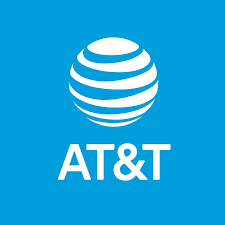 | T-Mobile |
|---|---|---|---|
| Network Coverage | Broad coverage, often considered the most extensive network in the U.S. | Extensive coverage, competitive with Verizon | Nationwide coverage, competitive with Verizon and AT&T |
| Monthly Plans | Verizon offers various plans including Start Unlimited, Play More Unlimited, Do More Unlimited, and Get More Unlimited, with varying data allowances and features. | AT&T offers plans such as Unlimited Starter, Unlimited Extra, and Unlimited Elite, each with different data limits and additional features. | T-Mobile offers plans like Essentials, Magenta, and Magenta MAX, with varying data allotments and additional perks. |
| Pricing | Pricing can vary based on plan choice, number of lines, and additional features. Generally, Verizon tends to be on the higher end of the price spectrum. | AT&T’s plans are competitively priced, and they often offer bundle deals with their other services like TV and internet. | T-Mobile typically offers competitive pricing, with a focus on value and perks included in their plans. |
| 5G Availability | Verizon has a robust 5G network, including both high-band (mmWave) and nationwide low-band 5G. | AT&T offers both mmWave and nationwide low-band 5G, with an extensive network. | T-Mobile boasts an extensive low-band and mid-band 5G network, covering a wide range of areas. |
| Additional Services | Offers a range of additional services including Verizon Fios (internet), Verizon Wireless Home Phone, and various IoT solutions. | Provides a variety of services including AT&T TV, AT&T Internet, and DirecTV. | Offers services such as T-Mobile Home Internet, TVision (streaming TV service), and a focus on IoT solutions through their T-Mobile for Business offerings. |
| Customer Support | Generally well-regarded for customer service and support. | AT&T has mixed reviews for customer service, with some customers reporting positive experiences and others having issues. | T-Mobile has made significant improvements in customer service and support, though individual experiences may vary. |

